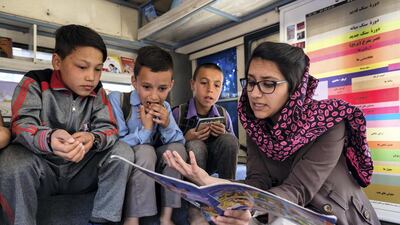It is a city where the sound of bombs is part of growing up, recently becoming the epicentre of the violence that plagues Afghanistan. In western Kabul, however, a big blue bus is bringing joy to some of the capital's younger generation.
Children emerge from alleys and houses, surrounding the vehicle and cheering its arrival, although a few watch cautiously given their fear of the unknown.
All that the bus contains, however, is books.
"Dear children, this is a library on wheels; we have lots of books and stories for you," Freshta Karim, an Afghan woman and founder of Charmaghz, tells them.
The name, which means walnut in Dari, one of Afghanistan's national languages, has special resonance as it represents the brain in local culture.
"It equates to logic. We are trying to promote critical thinking," Ms Karim explains.
"We want the kids to have opinions and share them, debate and be willing to listen to others opinions."
Nearly 17 years after the overthrow of the Taliban government, which outlawed women's education, the United Nations says only 31 per cent of Afghans are literate. The rate is almost twice as bad – 17 per cent – among women. An estimated 3.5 million Afghan children have never gone to school and 75 per cent are girls.
_________________
Afghanistan's president asks Taliban to join peace talks
Afghanistan's identity crisis erupts on social media
_________________
Ms Karim, a past recipient of the Chevening scholarship aimed at developing world leaders, recently returned from Britain after a master's degree, and wants to help change the statistics.
The library currently has 500 books, in Dari, Pashto as well as in English, but it is only part of Charmaghz's activities, backed by its founder's friends and private donations.
"I have always wanted to work with children and used to organise events and activities for the kids in my neighbourhood before I left for higher studies," she told The National.
Helping a little girl pick a book from their collection, she adds: "The mobile library is only the first project. The idea of Charmaghz is much bigger than this library."
For now at least, the library is a draw for the children.
Intrigued by the bus, a five-year-old named Sohail approaches one of three other volunteers helping Ms Karim.
"Do you have any books about cats?" he asks. "I love cats."
Charmaghz volunteer Mohammad Shahir is passionate about helping.
"The idea is to encourage reading among children in Afghanistan. With years of conflict, the children here don't usually have access to books and literature," the 23-year-old says, recalling his own childhood, many years of which were spent in wartime.
"When I was younger I loved to read, but I didn't have any place to get books; it was a time of war and conflict," he adds, just as the sound of a helicopter hovered above where the bus was parked.
At the other end of the bus, 10 to 12 children sit on the vehicle's carpeted floor, in true Afghan style, listening to another volunteer who reads a storybook out loud for them.
"For the younger kids who still don't know how to read and write or even the older ones who are not literate, we organise group sessions where we read and discuss stories with them," Ms Karim explains. Today they are reading the story of the Rabbit and the Lion, an Aesop fable translated in Dari.
The bus has been rented from the Ministry of Transport, and while Charmaghz has not received any government support, Ms Karim is grateful that the project is allowed.
"The fact that the government were open to such an idea is a valuable contribution in itself. It's often difficult to convince someone about new concepts, but they trusted us and we are very grateful for that," she says.
The Charmaghz team start after the morning rush hour, visiting two or three locations each day.
“We park the bus on the inside roads, and within communities, to avoid crowded places that could be likely terrorist targets," says Ms Karim.
While parents used to accompany children – and some still do – many youngsters await the bus eagerly.
About two hours is spent at each location encouraging participation.
"Apart from reading, we also have board games like chess; we also have poetry recitations and we play them songs about our country and culture," says Mr Shahir.
In one corner of the bus, reserved for solo reading, 10-year-old Zahra spoke of her favourite story, explaining that while she loves reading she does not have many books.
"I really enjoyed reading Badhsha-e-Tokham, about a king and his knight. It teaches you to always tell the truth," she says.
The library has also expanded her ability to help her siblings read.
"The new stories read here, I narrate them to my five sisters and brother at home," Zahra says, approaching Ms Karim and handing her three books brought from home.
"I have already read them. It's time for someone else to enjoy them."

